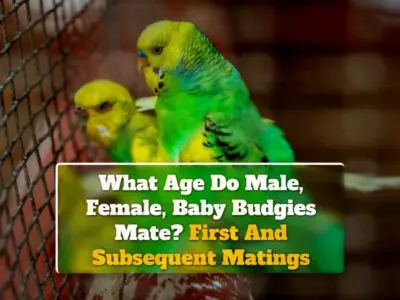The question of whether budgies mate for pleasure is not easily answered, as it’s challenging to determine avian emotions.
While certain mating behaviors might suggest they enjoy the process, it is primarily driven by their natural instinct to reproduce.
This guide on budgie reproductive behavior is for anyone curious about these fascinating creatures.
With my background as a budgie owner and a keen observer of bird behaviors, I’ve delved into the depths of the question – do budgies mate for pleasure?
It’s a complex yet engaging topic that needs to be explored, and it’s my belief that this content would serve as a useful resource for anyone seeking answers to such intricate queries.
Understanding Budgie Reproduction
In males, a part known as the cloaca serves as the outlet for their reproductive, urinary, and digestive systems, while females possess a similar organ known as the vent.
The primary mode of budgie mating, known as ‘cloacal kiss,’ involves the male and female pressing these organs together, facilitating the transfer of sperm.
Females, once fertilized, lay eggs in a nest where they incubate them for about 18 days (approximately 2.5 weeks) until they hatch.
The hatchlings, completely reliant on their parents for survival, mark the beginning of an intense period of nurturing, feeding, and protection.
The breeding season for budgies, primarily dictated by environmental conditions, can last most of the year, with the birds capable of producing several clutches.
This brief overview sets the stage for us to delve deeper into budgie mating behaviors, helping us comprehend the various elements that shape their reproductive life.
The Natural Drive For Procreation
At the very core of budgie behavior is the intrinsic and powerful instinct to procreate.
This drive, present in all forms of life, from the most minuscule bacteria to the mighty blue whale, is nature’s way of ensuring the continuation of a species.
So strong is this instinct in budgies that certain conditions and stimuli can awaken this primal urge, setting off a chain of physiological and behavioral changes that make these birds ready for the mating process.
One of the most significant factors influencing the natural drive for procreation in budgies is the availability of abundant food resources.
In the wild, budgies are primarily granivores, feasting on seeds and occasionally on fruits, flowers, and insects.
When food is plentiful, it sends a signal to these birds that conditions are favorable for raising offspring, thus triggering their breeding instincts.
Similarly, environmental conditions, particularly the onset of spring and summer, often stimulate budgie reproduction.
The warmer temperatures, longer daylight hours, and the general vibrancy of these seasons act as nature’s clarion call, signaling to the budgies that it’s time to mate.
Additionally, the availability of a secure nesting site is a critical factor that drives budgies’ desire to procreate.
Budgies, like many birds, are very selective about their nesting sites, often favoring locations that offer protection from predators and harsh weather.
In the wild, budgies nest in tree holes or rock crevices, and in captivity, they prefer nesting boxes.
A secure, cozy nesting site stimulates the mating drive in budgies, indicating to them that the conditions are safe for bringing up their young ones.
What’s more, budgies, especially males, are driven by a strong desire to establish territorial dominance during the breeding season.
Male budgies exhibit territorial behaviors such as chasing away other males and vocalizing loudly.
These behaviors serve as a way to attract females and deter potential rivals, thereby increasing their chances of successful mating.
So, while the act of procreation in budgies is deeply rooted in a primal urge to ensure their species’ survival, it’s also shaped by numerous external factors and innate behaviors.
It’s an intricate dance of biology and environment, instinct and stimulus, painting a complex yet fascinating picture of the reproductive life of these charming little birds.
According to a resource on Currumbin Vet Services (web.archive.com), once birds reach sexual maturity, they naturally strive to find a mate.
Their sexual behaviors aren’t influenced by recreation, but rather by the instinct to procreate.
The dynamics shift if a bird does not have a feathered mate to choose from, which can lead them to select a mate from their human caregivers.
The Role Of Pleasure In Budgie Mating
Having established the inherent drive for procreation in budgies, we now venture into the intriguing territory of pleasure in budgie mating.
It’s a topic that’s less charted, brimming with unanswered questions, and layered with complexities.
Do these vibrant little creatures experience pleasure while mating, much like humans and certain other animals? Or is their mating solely an act of procreation driven by primal instincts?
Animal pleasure, especially in the context of mating, is an incredibly complex subject that science is only beginning to comprehend.
The main hurdle is the lack of verbal communication in animals, making it difficult to truly discern their emotions or sensations.
Nevertheless, certain behaviors exhibited by budgies hint at the possibility of pleasure playing a role in their mating process.
Budgies, both in the wild and captivity, have been observed engaging in behaviors like purring and grinding their beaks, which are usually associated with a state of contentment and relaxation.
These behaviors often occur during or after mating, suggesting that budgies might indeed experience a sense of pleasure or satisfaction.
Moreover, budgies are known for their strong pair bonds and monogamous relationships, often staying with a single mate for life.
The bonding process involves a lot of physical contact, such as preening each other, feeding each other, and snuggling together, all of which could potentially stimulate pleasurable sensations.
This, in turn, might enhance the bond between the pair, encouraging repeated mating and thus increasing their chances of successful reproduction.
While these observations are compelling, it’s important to note that they are just that – observations.
The sensation of pleasure is highly subjective, even within human populations, and much more so when it comes to different species.
What we perceive as potential signs of pleasure in budgies could be something entirely different from their perspective.
Why Do Budgies Masturbate? (Rubbing Their Cloaca Or Vent)
It’s a topic that may raise eyebrows and ignite a sense of curiosity among budgie owners and bird enthusiasts alike – why do budgies masturbate? Notably, budgie masturbation, often evidenced by the bird rubbing its cloaca or vent against an object, is a behavior that has been reported by many budgie owners.
But what prompts this unusual behavior?
Budgie masturbation, while seemingly odd, is a natural behavior observed in many birds.
Typically, it involves the bird rubbing its vent against an object, another bird, or even its own foot.
This behavior is most common in male budgies, although females may also exhibit it occasionally.
While it’s challenging to definitively ascertain the reasons behind this behavior, several theories offer plausible explanations.
The most common one is related to sexual frustration.
When a budgie reaches sexual maturity but doesn’t have a mate or doesn’t have the opportunity to mate, it might resort to masturbation as a means to release sexual tension.
Moreover, hormonal changes, especially during the breeding season, can trigger this behavior in budgies.
As their hormones surge, budgies, much like other animals, experience a heightened sexual drive, which might manifest as masturbation, particularly in the absence of a mate.
Another aspect to consider is the bond that budgies form with their human caregivers.
Budgies are sociable creatures that form strong emotional connections with their human companions.
Sometimes, this bond can take on a pseudo-sexual dimension, with the budgie considering the human or even an object as its mate and engaging in mating behaviors, including masturbation.
That being said, it’s crucial to keep in mind that excessive masturbation can indicate underlying issues, such as boredom, stress, or even health problems.
If your budgie is frequently masturbating, it’s worth consulting a vet to rule out any potential medical concerns and discuss ways to manage the behavior.
How Should I React When I See Masturbation Behavior In Budgies?
When you observe your budgie engaging in masturbation behavior, it’s essential to remember that it’s a natural occurrence, often indicative of sexual maturity or hormonal changes.
Avoid punishing or scolding them; instead, approach the situation with understanding and respect.
If the behavior becomes frequent, it could signify underlying issues such as stress, boredom, or health concerns, warranting a consultation with a vet.
In the interim, providing more enriching activities and toys, or changing their diet can help manage the behavior.
If the budgie is masturbating on you or an object you’d prefer they didn’t, gently redirect their behavior without causing stress.
Recognize these situations as opportunities to learn more about the captivating world of bird behavior, ultimately contributing to the well-being and happiness of your feathered companion.



